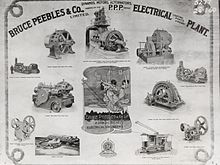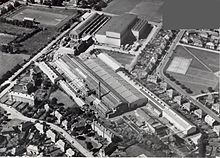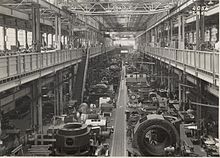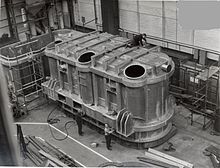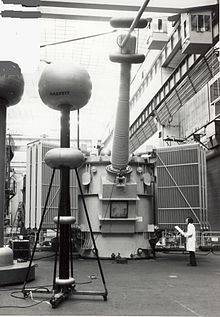- Bruce Peebles & Co. Ltd.
-
Bruce Peebles & Co. Ltd. was an Edinburgh industrial electrical engineering company founded as D. Bruce Peebles & Co. by Scottish engineer David Bruce Peebles (1826–1899) in Edinburgh in 1866. In April 1999 a major fire destroyed the main works in East Pilton, Edinburgh, an event from which the company never recovered, with trading ceasing in 2004.
History
The company initially specialised in gas engineering but later expanded to include electrical engineering as well. It continued to trade after Peebles' death and, in 1902, the name was changed to Bruce Peebles & Co. Ltd. In 1904 the company opened a new factory at a site in East Pilton, Edinburgh, employing 3,000 at its peak in the 1950s. The works had its own internal railway system, which was electrified and used electric shunting locomotives built by Peebles themselves. This was the first electric line in Edinburgh (main line electrification did not reach Edinburgh until the early 1990s).
The company held the British manufacturing rights for the Cascade converter and a licence to manufacture three phase electrical equipment designed by Ganz of Budapest.
During both World Wars, the works produced shells, submarine and aircraft parts, tank and electrical equipment such as mobile search lights and minesweeping units.
It also manufactured at least one (from an order of ten) electric locomotives for the Portmadoc, Beddgelert & South Snowdon Railway.
It was the main sub contractor for the electrification of the Woodhead Line between Manchester and Sheffield from 1947–1954, a major engineering achievement. Throughout this period it specialised in large scale transformers for power stations, including the world's largest 400kV 'quadrature booster' for the UK national grid. It also produced heavy electrical motors for various uses, including railway locomotives.
In 1969 the company became part of the Reyrolle and Parsons Group and by the late 1990s it was owned by Rolls-Royce plc and the Austrian company VA Tech.
Many young electrical engineers were taken on by this company, with a special course in electrical engineering being run at the nearby Telford College. They gained skills in highly specialised work, and Peebles' products were exported all over the world. The late Ron Brown, MP for Leith, was employed by the company, as was the late Sir Duncan McDonald who was the chief transformer designer[1].
In April 1999 a major fire destroyed the main works, an event from which it was never to recover. No assistance was forthcoming from any Government agency and the Edinburgh factory ceased trading in 2004, with the loss of all the remaining jobs. Much of the specialist equipment was removed to factories abroad.
References
Categories:- Manufacturing companies of Scotland
- Engineering companies of the United Kingdom
- Electrical engineering companies of the United Kingdom
Wikimedia Foundation. 2010.

